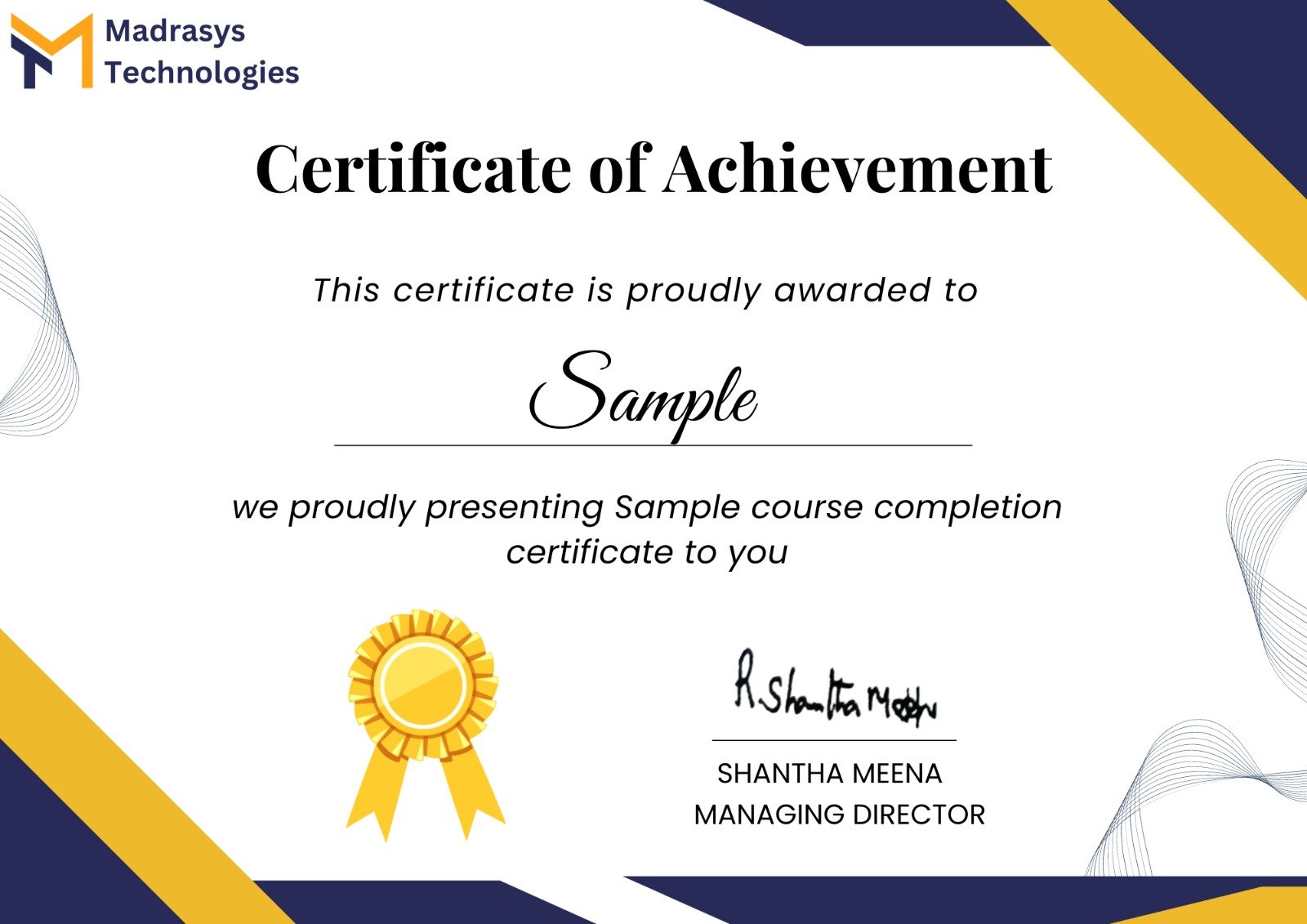Cloud Computing Training in Chennai

Enroll for Classroom
Course Highlights and Why Cloud Computing Training in Chennai at Madrasys Technologies ?
- Cloud Computing Training in Chennai with courseware curated by industry experts to cover Cloud Architecture, Services, Hosting, and Deployment.
- Cloud Computing Trainers in Chennai, Proficient trainers with over a decade of experience in the Cloud Computing platform.
- Extensive Cloud Computing Training in Chennai, Comprehensive training to equip you with fundamental Cloud Computing concepts.
- Interactive Cloud Computing Sessions in Chennai, Interactive, instructor-led Cloud Computing Training sessions in Chennai.
- Regular Recap Sessions in Chennai, Strengthen your skills with regular recap sessions of previous Cloud Computing classes in Chennai.
- Smart Classrooms in Chennai, Blended learning experience with smart classrooms for Cloud Computing training in Chennai.
- Affordable Cloud Computing Training in Chennai, offering professional training and certification upon course completion.
- Flexible Cloud Computing Batch Timings in Chennai, Choose from weekend, weekday, and fast-track batches to fit your schedule.
- Placement Assistance in Chennai, 100% placement assistance provided to eligible students after successful completion of the Cloud Computing training in Chennai.
- Company Tie-Ups in Chennai, Collaborations with over 600 companies, ranging from small to large enterprises for Cloud Computing professionals in Chennai.
- Active Placement Cell in Chennai, Dedicated placement cell to help students land their dream careers in Cloud Computing in Chennai.
- Join Madrasys Technologies for the best Cloud Computing Training in Chennai. Call 9884704697 to start your career in Cloud Computing.
Overview of Amazon Web Services Solution Architect Training in Chennai
The best AWS Training in Chennai provides hands-on experience with real-world projects guided by top AWS Certified mentors. Students delve into various aspects of AWS, including S3, EC2, Redshift, Lambda, and CloudTrail. Throughout the course, participants work on building AWS applications, understand SaaS, IaaS, PaaS, and Virtual Private Cloud, and learn best practices for AWS infrastructure.
Overview of Microsoft Azure Solution Architect Training in Chennai
The best Microsoft Azure Training in Chennai provides hands-on experience with real-world projects guided by top Azure Certified mentors. Students delve into various aspects of Azure, including Azure Blob Storage, Virtual Machines, Azure SQL Database, Azure Functions, and Azure Monitor. Throughout the course, participants work on building Azure applications, understand SaaS, IaaS, PaaS, and Virtual Networks, and learn best practices for Azure infrastructure.
Overview of Google Cloud Platform Solution Architect Training in Chennai
The best Google Cloud Platform Training in Chennai offers hands-on experience with real-world projects guided by top GCP Certified mentors. Students explore various aspects of GCP, including Google Cloud Storage, Compute Engine, BigQuery, Cloud Functions, and Stackdriver. Throughout the course, participants work on building GCP applications, understand SaaS, IaaS, PaaS, and Virtual Private Cloud, and learn best practices for GCP infrastructure.
Cloud Solution Architect Training Certification - AWS, Azure, and GCP
- The Cloud Solution Architect certification is awarded upon passing the respective associate-level exam (e.g., AWS Certified Solutions Architect - Associate for AWS, Microsoft Certified: Azure Solutions Architect Expert for Azure).
- Engage in real-time projects and assignments with practical implications in industrial scenarios, providing valuable hands-on experience to advance your career.
- Upon successful completion of the project work and achieving a minimum score of 60% on the quiz, you will receive the Cloud Solution Architect Course Completion Certificate, validating your proficiency in cloud architecture and solutions design.
Cloud Solution Architect Training Certification - AWS, Azure, and GCP
- The Cloud Solution Architect certification is awarded upon passing the respective associate-level exam (e.g., AWS Certified Solutions Architect - Associate for AWS, Microsoft Certified: Azure Solutions Architect Expert for Azure).
- Engage in real-time projects and assignments with practical implications in industrial scenarios, providing valuable hands-on experience to advance your career.
- Upon successful completion of the project work and achieving a minimum score of 60% on the quiz, you will receive the Cloud Solution Architect Course Completion Certificate, validating your proficiency in cloud architecture and solutions design.

AWS Syllabus
- A Short History
- Client Server Computing Concepts
- Challenges with Distributed Computing
- Introduction to Cloud Computing
- Why Cloud Computing?
- Benefits of Cloud Computing
- Private Cloud
- Public Cloud
- Hybrid Cloud
- Software as a Service (SaaS)
- Platform as a Service (PaaS)
- Infrastructure as a Service (IaaS)
- Subscription to AWS
- Introduction to the AWS Management Console
- Regions and Availability Zones – Choose the right Region
- Amazon Machine Images (AMI)
- Working with AMIs
- Choosing the right AMI
- Deciding what goes into an AMI
- Finding the right AMI
- Pricing model in EC2 instances
- On-demand, Reserved, Scheduled, Spot instances, Dedicated Hosts
- EC2 Reserved Instance Marketplace
- Importing and Exporting Instances
- Building an EC2 Windows instance & Linux Instance
- Bootstrapping with user data
- Setting up security
- Security with Key Pairs
- Working with the Security Group
- Different IPs assigned to an EC2 instance
- Assigning Elastic IPs
- Login/Access to the instance
- Creating your own custom AMI, Registering & Granting access to the AMI
- Placement groups
- EC2 instance protection
- Instance Roles
- Importing and Exporting Instances
- Elastic Network Interfaces (ENIs)
- Resources and Tags
- Accessing Meta-Data & use cases
- EBS Volume Types
- EBS Encryption
- EBS Performance
- Instance Store volumes
- Instance Stores Available on Instance Types
- Instance Store Usage Scenarios
- Adding Instance Store Volumes to an AMI
- Optimizing Disk Performance
- Creating and deleting volumes
- Attaching and detaching volumes
- Mounting and Unmounting the attached volume
- Increasing the volume size
- Creating snapshots
- Creating Volumes & AMIs from Snapshots
- Cross-Region snapshot copy & use cases
- What Is Elastic Load Balancing
- How Elastic Load Balancing Works
- Classic & App ELB types
- Creating a load balancer
- Internal & External Load balancers
- Load balancing protocols
- Listener Configurations
- SSL Negotiation Configurations
- Attach & Detach Subnets
- Security groups for the load balancer
- Configure health check for the load balancer
- Adding multiple instances to the load balancer
- Custom Domain Names
- Cross-Zone Load Balancing
- Sticky Sessions
- Creating and deleting buckets
- Adding objects to buckets
- Getting objects
- Deleting objects
- Notifications
- Uses of S3 storage
- Working with Permissions of S3, Access Control, Bucket policy
- S3 Data encryption types
- Enable Versioning, Logging for S3 objects
- Lifecycle rules in S3
- Creating Vaults
- Working with Archives
- Accessing the Glacier vault using tools
- Using Glacier for backups
- Job Operations
- Data Retrieval Policy Operations
- Creation of user accounts
- Setting up multi-factor Authentication (MFA)
- Roles in IAM
- Groups in IAM
- Delegation of permissions for users
- Creation of custom policies for delegation
- Using Identity Providers
- Cross-Account Access
- Account settings
- Credential Report
- Encryption - Key Management Service (KMS)
- Different types of networks that can be setup in AWS
- Creating a custom VPC
- NACLs & Security Groups
- Creation of Internet Gateway (IGW)
- Connecting to instances in the gateway
- Subnets, Route Tables & Association
- NAT Instances & NAT Gateways
- DHCP Options Sets & DNS
- VPC Peering
- VPN overview & components
- Configuring Amazon Route 53 as Your DNS Service
- Registering a Domain Name and Configuring Amazon Route 53 as the DNS Service
- Migrating DNS Service for an Existing Domain to Amazon Route 53
- Creating a Subdomain That Uses Amazon Route 53 without Migrating the Parent Domain
- Health Checks and DNS Failover
- Creating, Updating, and Deleting Health Checks
Azure Solution Architect Syllabus
- Manage Azure AD objects
- Create users and groups
- Manage user and group properties
- Manage guest accounts
- Perform bulk user updates
- Configure self-service password reset
- Manage role-based access control (RBAC)
- Create a custom role
- Provide access to Azure resources by assigning roles
- Manage multiple directories
- Manage subscriptions and governance
- Configure Azure policies
- Configure resource locks
- Apply tags
- Create and manage resource groups
- Manage subscriptions
- Configure Cost Management
- Manage storage accounts
- Configure network access to storage accounts
- Create and configure storage accounts
- Manage access keys
- Implement Azure storage replication
- Manage data in Azure Storage
- Install and use Azure Storage Explorer
- Configure Azure files and Azure blob storage
- Create an Azure file share
- Configure Azure blob storage
- Configure high availability
- Deploy and configure scale sets
- Configure VHD template
- Deploy from template
- Save a deployment as an ARM template
- Automate configuration management by using custom script extensions
- Configure Azure Disk Encryption Move VMs from one resource group to another Manage VM sizes Add data discs Configure networking Redeploy VMs
- Create and configure Azure Kubernetes Service (AKS)
- Create and configure VNET peering, Configure private and public IP addresses, network routes, network interface, subnets and virtual network
- Configure Azure DNS, Configure custom DNS settings and Configure a private or public DNS zone
- Create security rules, associate an NSG to a subnet or network interface ╸ evaluate effective security rules
- Deploy and configure Azure Firewall
- Configure Application Gateway, configure load balancing rules, troubleshoot load balancing
- Monitor on-premises connectivity
- Use Network Watcher
- Create and configure Azure VPN Gateway
- Create and configure VPNs
- Monitor resources by using Azure Monitor
- Configure and interpret metrics
- Configure Log Analytics
- Query and analyze logs
- Set up alerts and actions
- Configure Application Insights
- Configure and review backup reports
- Perform backup and restore operations by using Azure Backup
- Create a Recovery Services Vault
- Create and configure a backup policy
- Perform site-to-site recovery by using Azure Site Recovery
- Interview Q&A
- Weekly Assignments
- 100% SnowPro Certification Clearance
- Lifetime Recordings Access
Testimonials
"Madrasys Technologies' Cloud Computing course is extremely comprehensive and can benefit professionals from any field. If you are interested in mastering cloud platforms like AWS, Azure, or Google Cloud, I highly recommend this course."
Kaviya"The goal of the Cloud Computing course gave me confidence that I was on the right track to understanding how to effectively deliver cloud solutions. The lessons were extremely beneficial to my career."
AK Arjun"This course covers the most important aspects of cloud computing in detail, with additional practical resources and videos for when you want to deepen your knowledge on specific topics. Highly recommend for anyone looking to advance in cloud technology."
Rajesh KFAQs AWS Solution Architect training in chennai
- Creating and delivering secure and dependable applications with AWS technologies
- Defining solutions based on architectural design concepts that are in sync with customer needs, and Providing best-practice implementation guidance throughout the project life cycle
- The AWS Certified Solutions Architect Associate certification validates your expertise in these critical areas and sets you apart from non-certified peers.